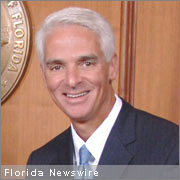HOMESTEAD, Fla. /Florida Newswire/ -– Governor Charlie Crist today joined Florida Fish and Wildlife Conservation Commission (FWC) Chairman Rodney Barreto for the release of Patsy the Manatee, a 1,000-pound pregnant manatee rescued last month in Key Largo. The Governor assisted staff from the FWC, the United States Fish and Wildlife Service, the United States Geological Survey, the Miami Seaquarium and other organizations as they released the manatee back into the wild at Biscayne National Park headquarters.
 “The rescue and successful release of Patsy the Manatee is a credit to all of the hard-working organizations and volunteers involved in protecting Florida’s environment and wildlife year-round,” Governor Crist. “Today’s release is just another example of their dedication and commitment to saving the Florida manatee, one of Florida’s natural treasures.”
“The rescue and successful release of Patsy the Manatee is a credit to all of the hard-working organizations and volunteers involved in protecting Florida’s environment and wildlife year-round,” Governor Crist. “Today’s release is just another example of their dedication and commitment to saving the Florida manatee, one of Florida’s natural treasures.”
FWC biologists and volunteers from the Dolphin Research Center rescued Patsy on April 29, 2009, after discovering her flipper had become severely entangled in monofilament fishing line. Patsy was taken to the Miami Seaquarium where she was successfully treated.
During her treatment and rehabilitation, veterinarians determined Patsy was pregnant and likely to give birth this summer. The veterinarians cleared her for release so she can continue to heal on her own and deliver her calf in the wild. The United States Geological Survey will monitor Patsy with a Global Positioning System (GPS) tag as part of an ongoing study.
“The release of this manatee is a success story. Although it is not clear if human negligence was the cause of the entanglement, we strongly encourage anglers to properly dispose of fishing line,” said Rodney Barreto, FWC chairman. “It’s up to all of us to do our part to ensure the survival of manatees and other native species.”
Monofilament fishing line can cause serious injury or death for a variety of Florida wildlife. Florida’s Monofilament Recovery and Recycling Program is a statewide effort to educate the public about the problems caused by monofilament line left in the environment. The program encourages recycling through a network of line recycling bins and drop-off locations and conducts volunteer fishing line cleanup events. For more information, visit www.fishinglinerecycling.org.


